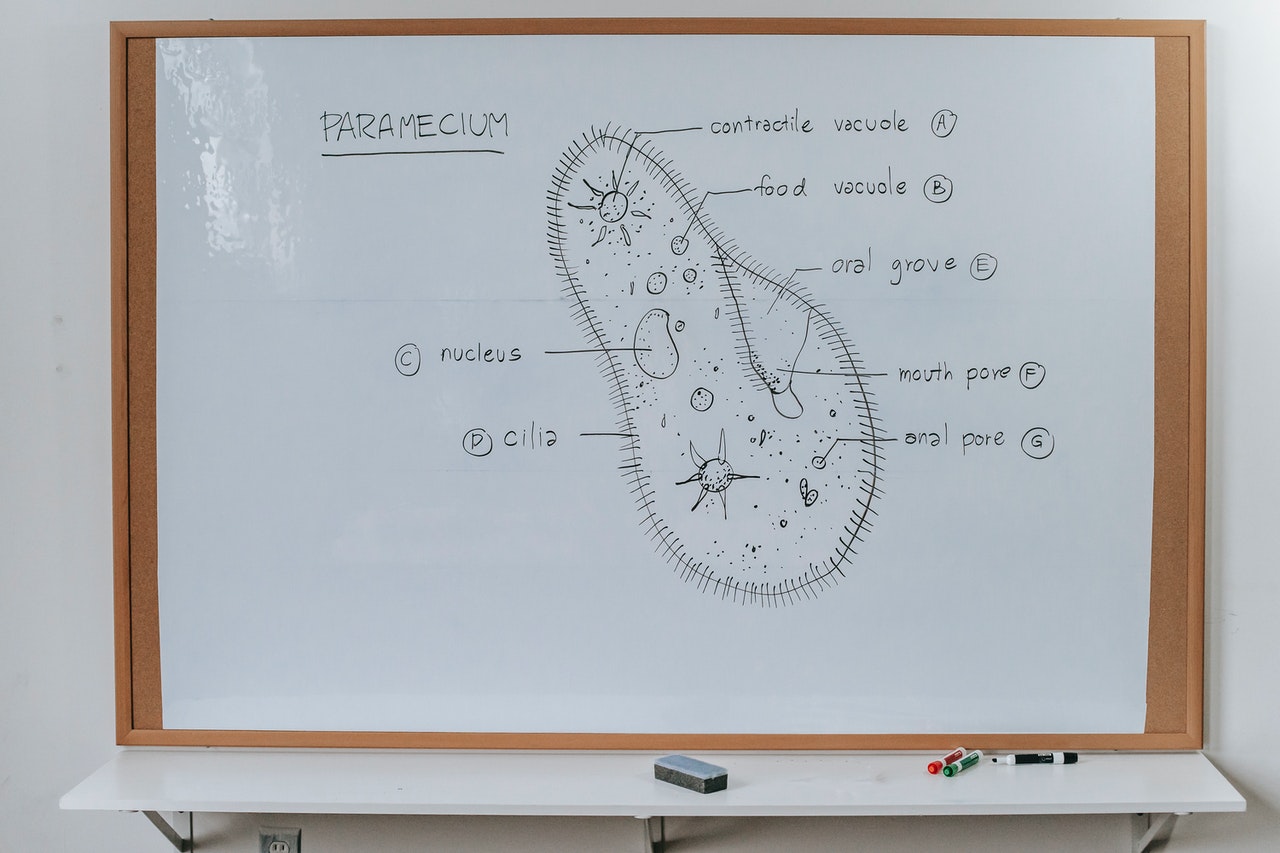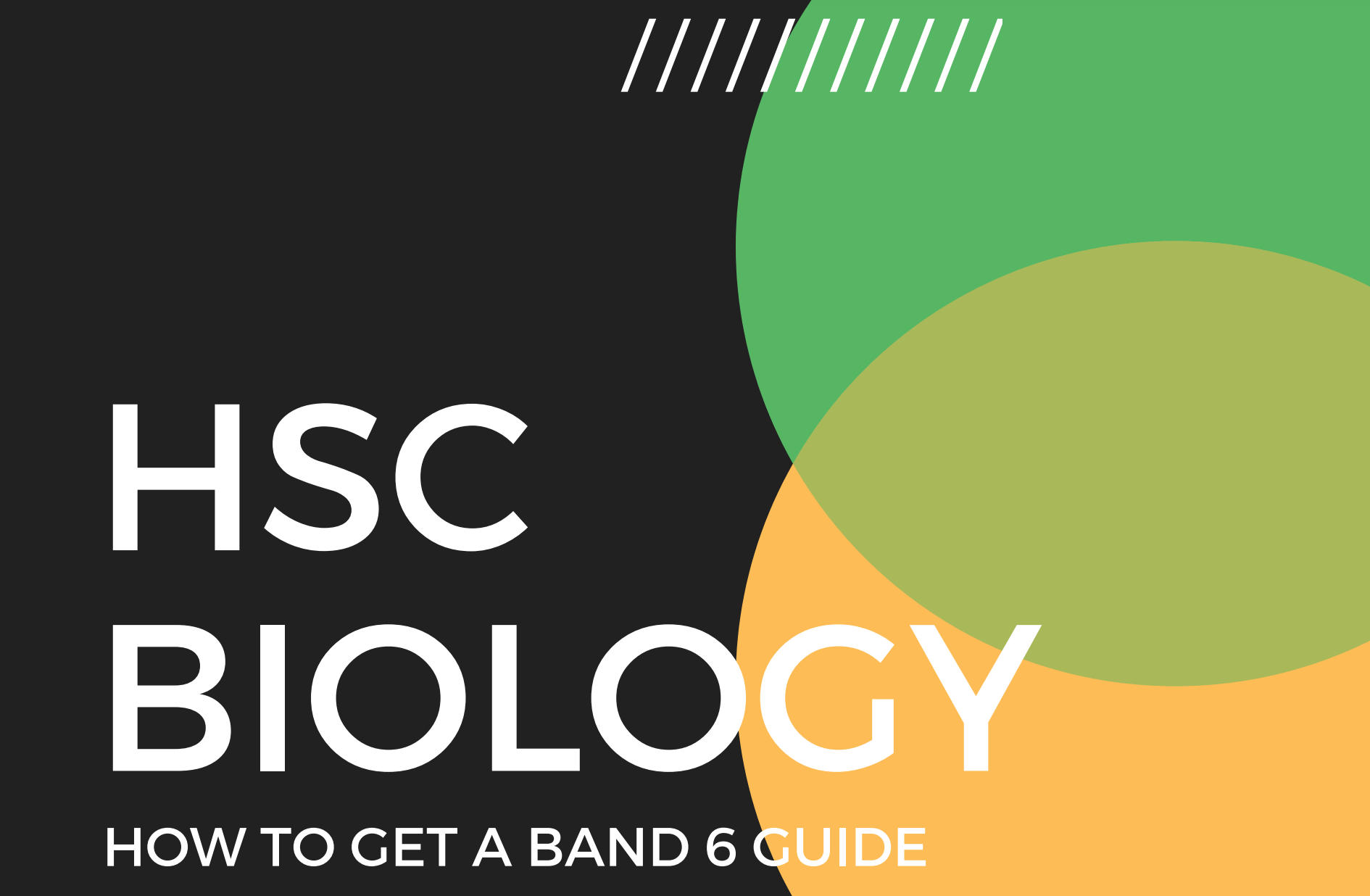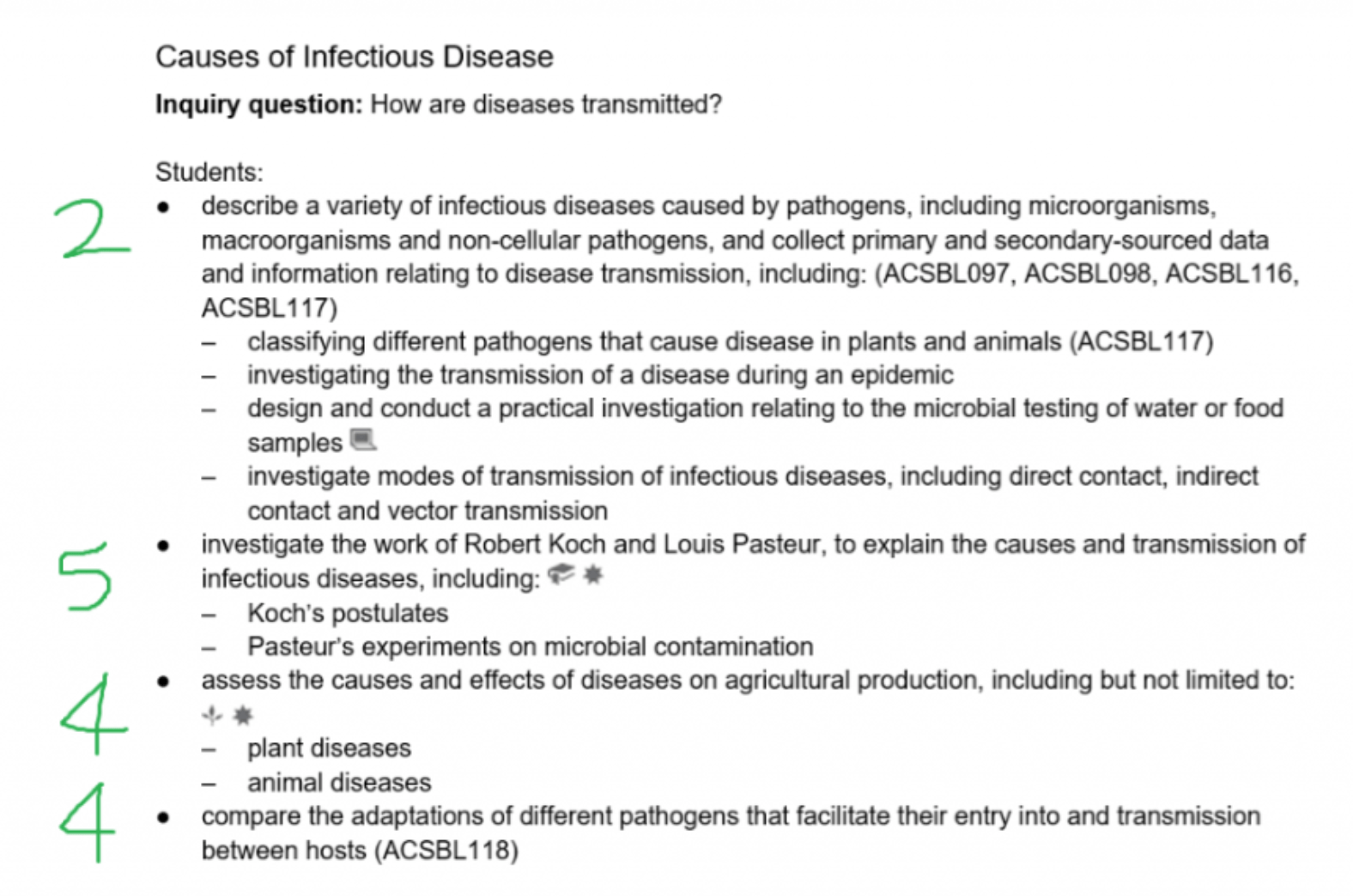Are you struggling to wrap your head around HSC Biology? Aiming for a Band 6, but need some help getting there?
Well, look no further, because you’ve come to the right place.
We’re about to run you through a bunch of handy tips which will help you on your way to HSC Biology band 6.
Tip #1: Get Up to Speed with the HSC Biology Vocab
Tip #2: Perfect Your HSC Biology Study Notes
Tip #3: Understand How to Write a Research Report
Tip #4: Always Check Your Work!
Tip #5: Get Resourceful!
Tip #6: Remember that Practice Questions are Key
Tip #1: Get Up to Speed with the HSC Biology Vocab
With FOUR different modules covered in your HSC year of studying Biology, there’s a lot of terminology you need to be familiar with for each of them!
To give you an idea of the terminology covered in Biology, we’ve included a table of key words from the Genetic Change module below:
| Term | Definition | Example and related concepts |
|---|---|---|
| Mutagen | Anything causing mutations | Cigarette smoke |
| Mutation | A change in DNA sequence | Point mutations are one nucleotide differences in a gene (CTAGTA CTTGTA) |
| Genetic flow/gene mutation | Introducing genes of one population into another by breeding between two populations | A bee carrying the pollen from one population of flowers to another can be considered genetic flow |
| Genetic diversity | Variation in a genetic pool for a particular characteristic | Genetic diversity is the reason why some people have black hair, others have brown hair, and others still can have blonde or red hair. |
| Biotechnology | Using biology for industry | We can use massive cultures of bacteria to make drugs at the industrial scale |
| Artificial insemination | Taking semen from a male animal and inserting it into a female uterus | Farmers pick which cows mate to ensure that the cow with the best characteristics mate and to prevent inbreeding |
| Artificial pollination | Taking pollen or stamen from one plant into the pistil of another | The characteristics of flowers can be mixed |
| Cloning | Creating a genetically identical copy of an organism | Whole organism cloning of dolly the sheep |
| Transgenic organisms | Species which are the result of genetic modification | 'Anti-freeze strawberries’ |
You can find our complete list of HSC Biology terms and definitions here! You’ll also be able to download the list to have on hand as you study.
Tip #2: Perfect Your HSC Biology Study Notes
The secret to doing well in your HSC is having a strong set of notes. In the tumultuous period that is your final year of high school, your notes should essentially be an extension of yourself — they are something you are constantly editing and refining, adding to and summarising.
HSC Biology is very content-heavy and so having well-structured notes is essential. Unsure how to do this? We’ve broken it down into four easy steps!
Step 1: Figure out your learning style
At this point in your education, you’ve no doubt heard about the different learning types. Every student is different and so it only makes sense that the way they learn is unique to them.
Step 2: Do a needs analysis
After you’ve figured which learning style best suits you, now it’s time to suss out your strengths and weaknesses. Ask yourself, which areas of the syllabus do I struggle with the most? Which syllabus dot points do I have the strongest understanding of?
A great way to answer these questions is by looking back on old exams and practice questions to see where you’ve previously gone wrong.
Struggled in Year 11? It might be worthwhile to revise the fundamentals of the subject and fill any learning gaps you might have! Check out our Guide to Year 11 Biology Module 1: Cells as the Basis of Life for a clear breakdown of everything you need to know and more module guides inside!
We recommend grabbing a copy of the syllabus and physically rating your understanding of each dot point. This will help you prioritise your study, as well as track your learning growth!
Step 3: Summarise content
Once you’ve sorted out what you need to study and the priority of each syllabus dot point, you can start summarising the content. Make sure you’ve got a section for all syllabus points and that your notes are written in your own words.
Have all the necessary information, but don’t go overboard. Remember, as you get closer to exam periods, these notes should be a brief summary of the content, so that you can quickly skim them before important exams.
Step 4: Learn them
Once you’ve written your notes, it’s time to learn them!
A super important thing to remember is that learning your notes should be an ongoing process throughout the year. Leaving it until right before the exams to memorise 90 pages of notes is unrealistic.
Setting aside an hour or two each week to read through your notes will save you a lot of hassle and stress in the end!
For more on writing up your HSC Biology study notes, check out our article here!
Tip #3: Understand How to Write a Research Report for HSC Biology
In HSC Biology, you’ll be tasked to write a research report! But what is a research report and how do you write one?
Essentially, a research report is a summative article that you need to write up, based on an investigation or experiment that you’ve done.
Research reports are a simple way to share results and methodology with others, as they detail investigations or experiments in a succinct manner.
Structure of a Research Report
There are 8 parts to your research report involving the following:
- A title
- The author/s
- An abstract
- Introduction
- Methodology and Materials
- Results
- Discussion
- References
Check out our in-depth guide to writing a research report for HSC Biology here!
Tip #4: Always Check Your Work!
You’ve probably heard it a thousand times, but editing and proof-reading your work is a must. You need to double check and then triple check your work every time!
Now this is something you do as you are preparing for your HSC Biology exam. Obviously it’s essential to double check your work during the exam, but you also only have a limited amount of time to rework what you’ve written!
So this tip is something to implement in order to build up your confidence with writing a Biology Extended Response.
The process of drafting and redrafting your Biology Extended Response is super important. It is a sure-fire way of making sure your answer completely addresses the question and you haven’t accidentally allowed any silly errors to slip past you.
Tip #5: Get Resourceful!
The secret to acing your HSC is working smarter, not harder. High-achieving students know how to use their time effectively but, more importantly, they also know how to make the most of the resources available to them.
The Benefits
Familiarising yourself with textbooks, e-resources and databases beyond what is assigned in class has two main benefits.
The first benefit is that it can help you better understand the content. If you’re struggling to make sense of your teacher’s explanation of genetic variation, you can use online textbooks and websites to find an alternative explanation better suited to your learning style.
Sometimes, no matter how hard we try, things just don’t click and so having an array of different resources to turn to can be super helpful!
The second benefit is that external resources can expose you to more challenging content and questions. This is particularly useful for students aiming for a Band 6.
The Importance of Using External Sources
Think about it, your teachers need to plan their lessons to accommodate all skill levels. This means they cannot spend the entire class walking through Band 6 questions.
So, it would be in your best interest to use other resources on top of what is given to you by your teacher. This way, you can find appropriate questions and examples which challenge you to the extent that you want to be!
But remember, always refer back to the syllabus to ensure you’re not venturing too far beyond what is necessary!
It is great to use different resources, but make sure they’re relevant. The last thing you want to be doing is wasting precious time attempting difficult questions that have no relevance to the syllabus and won’t help you come exam time.
Here is a handful of recommended resources to get you started:
HSC Together
This website is a fantastic FREE video resource platform housing thousands of videos focused on the HSC syllabus. The site is super easy to navigate, with content dedicated to every single syllabus dot point.
Textbooks
With students nowadays being so reliant on laptops, you might think clunky hard-copies or laggy PDFs of Biology textbooks are a thing of the past. But, I’m here to assure they definitely are not.
In fact, textbooks can be a student’s single greatest resource. They give really good explanations of the content, include easy-to-understand diagrams, offer useful chapter summaries which can be used for revision and even provide example questions for you to test out your knowledge.
Google Advanced Search
This one’s more of a time-saving resource, but it’s useful and worth looking into nonetheless.
Google Advanced Search allows you to narrow your search by domain to make sure that you only get sites which will be useful to you. It can help you weed out unreliable and irrelevant sources, so you can get straight to the good stuff!
Find out more about using external sources here!
To make studying for HSC Biology that much easier, we’ve got module breakdowns that you can check out below:
Tip #6: Remember that Practice Questions are Key
Practice questions are essential. They are one of the most effective means of studying as they most closely mimic what will be expected of you in the exam.
Ideally, all of your note-taking and note-refining should lead to a point where you can sit down and comfortably complete practice questions!
How to Ace Biology 5-Marker Questions
There are two types of HSC Biology extended response questions — factual and assessment.
For factual questions, you need to synthesise dot point information from the syllabus to explain a phenomenon. Alternatively, assessment questions require you to synthesise syllabus information to make an assessment of a phenomenon.
Once you’ve figured out which of these categories your 5-marker belongs to, you need to identify what exactly the question is asking of you.
Figure out which syllabus dot points it is referring to, synthesise your notes to gather all relevant information, communicate your response clearly and logically, and finally, proof your response.
Head here for our master list of HSC Biology past papers and check out our own list of practice questions for each module!
For even more helpful advice, check out our HSC Biology Band 6 Guide below for more helpful tips and tricks!
Aiming for a Band 6 in other HSC subjects?
Check out our study guides for the various subjects below:
- Ancient History
- Economics
- Business Studies
- Legal Studies
- Visual Arts
- Standard English
- Advanced English
- Modern History
- Mathematics
- Physics
- Chemistry
Looking for some extra help with HSC Biology?
We have an incredible team of HSC Biology tutors in Sydney and mentors who are new HSC syllabus experts!
We can help you master the HSC Biology syllabus and ace your upcoming HSC Biology assessments with personalised lessons conducted one-on-one in your home, online or at one of our state of the art campuses in Hornsby or the Hills!
To find out more and get started with an inspirational HSC Biology tutor and mentor, get in touch today or give us a ring on 1300 267 888!
Jessica Arentz is a Content Writer at Art of Smart and an undergraduate student at the University of Sydney where she studies a Bachelor of Arts/Advanced Studies (Media and Communications) (Marketing). She currently volunteers at 2SER community radio station as a producer and newsroom reader. When not writing, you can find Jess searching the web for cheap flights or spending her days with her head buried deep in a book.











